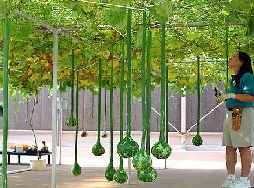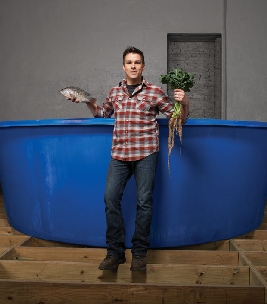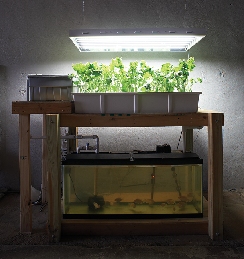The Urban Farmer, Issue #062 *
October,
2013:

“”A garden is a symbol of man’s arrogance, perverting nature to human ends
…”
~Tim Smit
Indoor Aquaponics in the Cold, Cold North

Photo:
David Bowman
Urban Organics’ David Haider stands in
front of one of several 13 200-liter tanks that will soon be
home to 1000 tilapia, which will in turn help feed thousands
of plants.
The old Hamm’s brewery looms
over the gritty East Side of St. Paul,
Minn., a redbrick citadel of suds that rolled out its last
barrel in 1997 and then became a 3-hectare site for urban
explorers to shoot trophy pictures and for graffiti artists to
showcase their mad skillz.
But beyond the busted windows and
spray-painted tags, business partners Chris Ames, Fred Haberman,
and David and Kristen Haider of Urban Organics see an indoor
farm. Using a hybrid farming method called aquaponics, which
combines aquaculture (fish farming) and hydroponics (growing
plants in water), this massive, 4700-square-meter indoor field
of greens will feed thousands of fish and be fertilized by the
resulting fish poop. Nothing will go to waste.

Photo:
David Bowman
The seed of the idea for Urban Organics
germinated in this aquaponics setup that David Haider built
in his basement two years ago.
PASSIVE SOLAR GREENHOUSE DESIGN
Aren’t all greenhouses solar?
Well, technically yes but there’s more to it than that…
After lots of research, some passive solar
methods have been developed that work quite well! These techniques include:
- Siting of the greenhouse to take advantage
of the sun’s path
- Strategically placed insulation
- Using certain colors inside the greenhouse
for heat conservation.
- Using a “Heat Sink” to store heat during
the day so it can be released at night.
Grab all the details here:
Passive Solar Greenhouses
Video of the Month:
Remember this oldie but goodie?
Why
bother with hydroponics?
Hydro Tip of the Month- How
much space to you need for each crop?
SPACE REQUIREMENTS
- Tomatoes, peppers,
eggplants, broccoli, beans, peas–
1 sq foot
- Cucumbers, cabbage,
squash, melons—— 2 sq foot
- Basil, Bibb and
Buttercrunch lettuce——— 6″ x 6″
- Looseleaf and Oakleaf
lettuce———-7″ x 7″
- Herbs————3″ x
3″ or 4″ x 4″
There is more “food for
thought” about choosing what to plant and when, here:
What To Grow?
We hope you have enjoyed this issue of The Urban Farmer Ezine. Each month, we will bring you another inspiring photo, gardening quote or idea, plus fresh new hydroponics news, techniques & products.
Insiders tips to get you growing…

~Stella and Simon from
Hydroponics-Simplified.
|






Reply